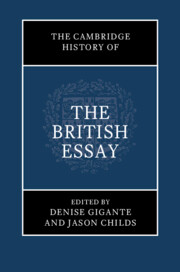Book contents
- The Cambridge History of the British Essay
- The Cambridge History of the British Essay
- Copyright page
- Contents
- Illustrations
- Contributors
- Acknowledgements
- Preface to a History in the Manner of an Essay
- Part I Forming the British Essay
- Part II The Great Age of the British Essay
- Part III Assaying Culture, Education, Reform
- 20 The Essay and the Theme
- 21 The Academic Essay: Rhetoric and Pedagogy
- 22 The Essay and the Rise of University English
- 23 Victorian Essays in Criticism
- 24 Nineteenth-Century Reviews Reviewed
- 25 Essays in the ‘Golden Age’ of the British Newspaper
- 26 The Essay in the Age of Chartism
- 27 Political Theory and Ethics in the Victorian Essay
- 28 Plain English: Essays and Analytic Philosophy
- Part IV Fractured Selves, Fragmented Worlds
- Part V The Essay and the Essayistic Today
- Book part
- Bibliography
- Index
23 - Victorian Essays in Criticism
from Part III - Assaying Culture, Education, Reform
Published online by Cambridge University Press: 31 October 2024
- The Cambridge History of the British Essay
- The Cambridge History of the British Essay
- Copyright page
- Contents
- Illustrations
- Contributors
- Acknowledgements
- Preface to a History in the Manner of an Essay
- Part I Forming the British Essay
- Part II The Great Age of the British Essay
- Part III Assaying Culture, Education, Reform
- 20 The Essay and the Theme
- 21 The Academic Essay: Rhetoric and Pedagogy
- 22 The Essay and the Rise of University English
- 23 Victorian Essays in Criticism
- 24 Nineteenth-Century Reviews Reviewed
- 25 Essays in the ‘Golden Age’ of the British Newspaper
- 26 The Essay in the Age of Chartism
- 27 Political Theory and Ethics in the Victorian Essay
- 28 Plain English: Essays and Analytic Philosophy
- Part IV Fractured Selves, Fragmented Worlds
- Part V The Essay and the Essayistic Today
- Book part
- Bibliography
- Index
Summary
A period of significant demographic, social, and political transformation produced essays marked by a deep seriousness of tone and a sense of weighty purpose that departed sharply from the playful quality of the periodical tradition and the lighter touch of the Romantic familiar essay. Essayists in criticism of this period (Matthew Arnold, Walter Pater, William Morris, Oscar Wilde) were deeply engaged in defining ideas of culture that could encompass an increasingly diverse and fragmented society. This chapter reflects on the publication contexts that shaped some of the best-known examples of the Victorian critical essay; examines Victorian critics’ emphasis on specific capacities in perception as a ground for pedagogical exposition with the aim of achieving social coherency; and highlights the deep historicism and awareness of mediation that informs the Victorian essayist’s approach to cultural criticism.
Keywords
- Type
- Chapter
- Information
- The Cambridge History of the British Essay , pp. 340 - 355Publisher: Cambridge University PressPrint publication year: 2024

